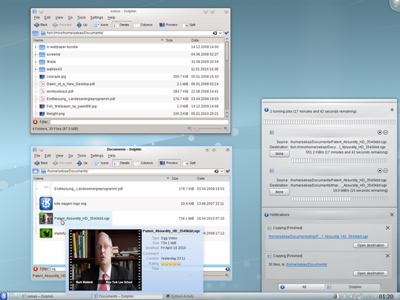By Joe Wilcox, Betanews
They say that the devil is in the details. But some things are so evil, the horned harbinger of deceit and doom is an obvious and menacing presence. The Google-Verizon proposal for an "open Internet" is the worst kind of evil, because Google so ardently asserts that "you can make money without doing evil" and the companies convincingly con with a deceitful sleight of hand. Their proposal for an open Internet is nothing of the kind. Google and Verizon offer to grant something people already have (unfettered, wired broadband) while exempting something Internet users want more of (unfettered, mobile wireless).
But the proposal's deceit goes further. Google and Verizon have put before the US government a huge carrot, while hiding behind their backs an even bigger stick. The two companies want the US Congress to pass their proposal into law, thus empowering the Federal Communications Commission to exert more control over the wired Internet. There are plenty of folks on Capitol Hill who want more Net control, and Google and Verizon have wrapped it up with ribbon and bow. The government's authority would be under the guise of keeping the Internet free and open for everyone -- ensuring Net neutrality. For lawmakers, the proposal is a seeming goldmine of goodwill during a tough election year.
Too bad. Should Google and Verizon get what they ask for, the proposal would stop short of giving the FCC real authority beyond established wired broadband, and even there loopholes undermine real regulatory reach. For example, the proposal's "Network Management" section asserts that "Broadband Internet access service providers are permitted to engage in reasonable network management. Reasonable network management includes any technically sound practice: to reduce or mitigate the effects of congestion on its network; to ensure network security or integrity; to address traffic that is unwanted by or harmful to users, the provider's network, or the Internet"...etc. That's a big loophole that would allow bandwidth-capping lover Verizon to put limits on subscribers or even services. There's nothing "open" about Internet access where somebody's access is limited.
I'll skip the other loopholes and get to the grift, where the proposal would essentially exempt wireless broadband from the same Net neutrality rules applying to wired broadband. From the proposal:
Because of the unique technical and operational characteristics of wireless networks, and the competitive and still-developing nature of wireless broadband services, only the transparency principle would apply to wireless broadband at this time. The U.S. Government Accountability Office would report to Congress annually on the continued development and robustness of wireless broadband Internet access services.
WTH? What a scam. You offer me a beer in the kitchen so you can frak my sister in the living room. We both get screwed.
Putting Limits on the Mobile Internet
There are many ways I would describe the Google-Verizon proposal: deceitful, lying, evil, conning, grifting, self-serving and mis-directing. The last descriptor expresses why the proposal is so evil. Google and Verizon make a somewhat reasonable pitch for "open" wired broadband Internet access as a means of obscuring the broader goal of seeking unequal -- non-Net neutral -- wireless access. It's an alarming deceit that seeks to undermine the most important evolution of the Internet: Anytime, anywhere access on anything.
I started writing about anytime, anywhere, on-anything access about six years ago. It's the magic behind Web 2.0, Web 3.0, cloud computing or whatever else you want to call it. As people use more mobile devices to connect to the Web, anytime, anywhere, on-anything access grows in importance. In the United States, the number of smartphone users is increasing at an alarming rate. There were 49.1 million smartphone owners in May, according to ComScore, up 8.1 percent in three months. Among Americans 13 or older, 234 million used a mobile phone in May.
Demand for bandwidth-sucking mobile content increases with the number of smartphone users. American cell phone data usage for October 2009 compared to May 2010:
- Web browsing: 26.8 percent; 31.9 percent
- Downloading apps: 18.3 percent; 30 percent
- Accessing social networks/blogs: 13.8 percent; 20.8 percent
Verizon doesn't want the kind of data congestion problems affecting AT&T. The proposal would ensure Verizon could cap subscribers, limit bandwidth-hogging services or prioritize others. Google wants to ensure people have access to its services, which are increasingly tightly tied to Android. With more than 160,000 activations a day, Android is quickly becoming what I predicted it would be in October 2009 post "iPhone cannot win the smartphone wars." Android is to mobile phones what DOS/Windows was to PCs.
But both companies clearly recognize that anytime, anywhere, on-anything access is the future of the Internet, and they want regulators busying themselves regulating something else. I've written plenty about the mobile Web's future. More recently:
Google's Self-Serving Greater Good
I'm not surprised about Google taking this approach, despite earlier long-winded prognostications for Net neutrality. In early 2007, Google argued for Net neutrality rules applying to a then upcoming wireless spectrum auction. In October 2005, at the now defunct Microsoft Monitor blog, I wrote:
Search is the most obvious way for Google to monetize informational access. But I believe the company's ambitions are bigger. Google, like Microsoft and Yahoo, knows that the big ad dollars are spent offline, with TV being a huge bucket of spending. Google wants to pull those ad dollars online. One approach is to make online more appealing, to increase the attractiveness of information, services and communications, so that more people spend more time online. Another approach is opening the floodgates of access -- anytime, anywhere, any device...I believe that Google wants to provide the means of getting to the information and create its own kind of lock-in over time, just as IBM and Microsoft did in their day. Right now, Google's hold is tenuous. There is little 'sticky' about search. Customers can change search engines by typing in a new Web address. But as Google releases more technologies for creating, storing and accessing information, the company's products and services grow stickier. How sticky they will eventually become will depend on a number of factors, including Google's execution and the response of companies like Microsoft.
Google's stickiest technology is Android tied to a plethora of informational and search services. Some of those services -- YouTube being obvious example -- are bandwidth hogs. The Google-Verizon proposal would ensure these services could get unfettered mobile Internet access and even preferential treatment. There is nothing Net neutral about that. It's cold, calculated business, with Google putting its own interests first, while blabbering on about the good of all humankind.
Verizon has until this proposal been fairly transparent about its Net-limiting goals. The company has never really professed to be or even pretended to be a do-gooder. Unlike "do no evil" Google.
In February, I warned that "Google is a dangerous monopoly -- more than Microsoft ever was" and asked "Why is Google suddenly so evil?"
The answer isn't rocket science. Public companies have a different moral objective than human beings. Google's moral agenda is determined by shareholders, which expect the informational giant to earn them money. In business, the moral high ground is quagmire. Public companies eventually sink down to the one moral objective: Their return-on-investment obligation to shareholders.
What's different now: How brazenly and deviously Google, in collusion with Verizon, proposes something so seemingly good to obscure broader self-serving objectives. All this talk about the greater good -- the "open Internet" -- is illusion. It's the magician's trick. Google can justify the proposal as not being evil, if the standard of "making money without doing evil" is returning back gobs of cash to shareholders. But by the measure of many human beings' moral compass, Google has committed a great evil.
I've had enough. Today, I will start a personal Google boycott. I'm going to wean myself off all Google services. I will switch off Gmail, use Bing search and eventually migrate my wife and daughter off Android smartphones. Because I use so many Google services, the transition will take several weeks, at least. My new motto: Google be gone.
Copyright Betanews, Inc. 2010










 Google
Google -
Google-Verizon -
United States -
Verizon -
Network neutrality


















